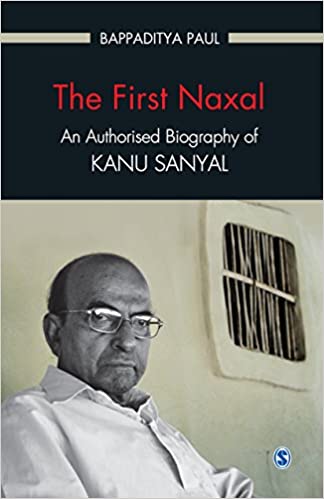Why I picked this book?
The Title of the book, “The First Naxal” was intriguing and instantly made interested in the book. Moreover, Naxal is a word very commonly used today and someone even coined a word “Urban-Naxal”. Most of us not even aware of how this word came into being and what exactly it stands for. And who were/are the people called as Naxals or Naxalites. This book is the biography of the person who started the “Naxalbari uprising” of the poor and landless people against the landlords. So, with the expectation that I would get to know more about the Naxals, their movement, and the person behind the Naxalbari uprising , I decided to read this book.
The book
The First Naxal is an authorized biography of Kanu Sanyal, who led the peasant uprising of 1967 in the village Naxalbari in northern West Bengal. The book takes you through the life of Kanu Sanyal, how he was attracted to communism, what made him leave his family and become a full-time party worker. His ideology and how it differed from other communists, his days during the peak of the Naxal movement. The book also throws some light on the different factions of the communist party and how their approach was different from each other despite all being labeled as “communists”.
The books start with the death of Kanu Sanyal. Reportedly he had committed suicide on 23rd March 2010 by hanging himself. At the time of his death, he was living in a village Sebdella Jote, among the people he worked and fought for. The author tells “Inside his hut there was a cupboard stacked with books, newspapers and files in one corner. In another corner slinging from a string are some used apparels. An unused covered with cobweb stands beside.” These were his only lifelong belongings.
The book takes us though his childhood days, where we get to know that he was not very good was studies and was a maverick. He had a disliking for Communists, as they used to vilify Netaji Subhash Chandra Bose, and used to call Netaji a quisling (a traitor), for his association with Hitler. This has nurtured a hostile feeling towards the Communists, and this feeling remined till his late teenage years.
The journey of how Sanyal was attracted and inducted in communist party. The motivation behind joining the party and then the decision to become a full-time party worker, which means leaving family and working devoutly for the party. The respect and awe he had for Charu Mazumdar, the leader of Communist party and later his ideological differences with his mentor.
He was given the area around Siliguri division of Darjeeling district to work among the tea workers and peasants. He developed a mass base among the people there through his organizational skills. The peasants in the area started an armed rebellion against landlord, took the paddy they had grown forcefully from the landlords and seized the land they used to work on. This happened in 1967 and was called Naxalbari uprising. In retaliation police fired killing women and children. The book provides many such details of the on-ground realities.
The life of Kanu Sanyal post Naxalbari uprising, his ideological difference with his mentor Charu Mazumdar on the use of violence as a means to further their ideology and work. Kanu was against unnecessary violence. His visit to China and his meeting with Mao, chairman of Communist Part of China. His days in jail during the emergency and after. The breakup in Communist party, and his continued work among the tribals and peasants of the area, the book provide all the information in detail.
One feel bad for Kanu Sanyal about how he died. Towards the end of his life, he was alone and lonely suffering physically as well as mentally. His realization that one should have a family to take care, to look after, to talk to makes the readers feel for him.
All in all, a great book that gives you insight into the life of a tribal and peasant leader and gives us insight about the communist movement, various factions of the movement and the ideological difference among them. But most of all it tells us about a person who dedicated his life for the most poor and vulnerable people.
About the Author
Dr. Bappaditya Paul is a senior reporter at The Statesman headquarters in Kolkata. He received his master’s degree in mass communication before joining The Statesman in 2005 as a staff reporter in Siliguri. Paul has published a number of articles on issues ranging from Naxalism to Gorkhaland Movement, and contemporary Indian politics to environmental degradation.
Our Verdict
The First Naxal is a great book to know about the leader of the Naxalbari uprising. Written in very simple and easy to read language, that provides the readers some insight into the Communist party of India, various factions of it and their ideology. If you love reading about India, this one should be on your reading list.
